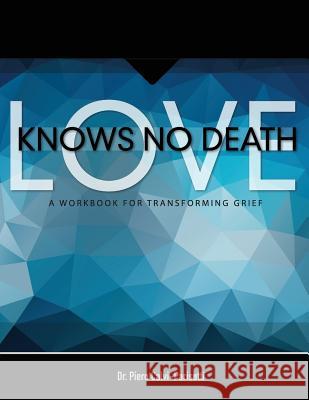Love Knows No Death: A Guided Workbook for Grief Transformation » książka
Love Knows No Death: A Guided Workbook for Grief Transformation
ISBN-13: 9780692570180 / Angielski / Miękka / 2016 / 74 str.
It is often said that that one never completely recovers from the loss of a loved one and the shock of bereavement leaves an indelible scar on one's soul that remains forever. Despite this, most bereaved people do return to living productive and meaningful lives, understanding that such pain is unavoidable and part of the human experience. However, in some cases the negative feelings and emotions do not subside over time and what psychologists refer to as "complicated grief" takes hold. This is a serious and debilitating condition that can take a toll on emotional and physical well-being. The good news is that, with appropriate help and support, even sufferers of complicated grief can transform their lives. This workbook is an essential part of the method known as "Love Knows No Death," an innovative approach to grief transformation. This counseling approach, which integrates both written and video lessons, reflects an "unbelievable truth" that the human mind, consciousness and personality do not end with the death of the physical body. In other words, your deceased love one is not, in fact, deceased. As one progresses through the workbook it becomes apparent that there is no religious agenda. The reality that we survive death is based upon established evidence and not blind faith, and the reader is encouraged to do their own reading, learning and thinking. The entire approach is based upon education and not preaching. This innovative approach to grief transformation is based upon established techniques of cognitive therapy. In other words, "The way you feel depends entirely on the way you think." When we learn to think "non-negatively" and replace negative, unrealistic and distorted thoughts with more balanced, neutral and realistic ones, dramatic results can be attained. The chapters and videos in this approach will take readers on a journey of exploration as they examine possible stumbling blocks, what really dies at death, and learn about the substantial evidence for life after life. Some of the phenomena examined include the powers of the mind, deathbed visions, near death experiences, apparitions, mediumship and instrumental trans-communication. Mental health professionals are coming to realize that patients who believe that their deceased loved ones still survive do better than those who do not believe in survival. The "Love Knows No Death" approach recognizes that vague hope or wishful thinking does not have the power to transform grief. Such transformation can only come from "knowing," which can be attained only through personal experiences, thorough examination of the evidence, and changing the way we think. Those who put the effort into diligently following this workbook may very well experience life changing effects. The "afterlife perspective," once integrated into the grieving process, will allow you to lead a better life and truly honor those who have passed before you.











